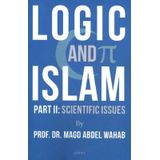Auto'sBaby & peuterBoekenCadeaus & gadgetsComputersDierenbenodigdhedenDrogisterijElektronicaErotiekEten & drinkenFietsenFilms & SeriesGamesHorlogesHuishoudelijkKantoorKledingKlussenMeubelsMode accessoiresMultimedia-accessoiresMuziekinstrumentenParfumerieSanitairSchoenenSieradenSoftwareSpeelgoedSport & OutdoorTuinartikelenWoonaccessoires
Als laatst door jou gezocht
0Cookies op beslist.nl
Beslist.nl gebruikt functionele en analytische cookies voor website optimalisatie en statistieken. Verder wordt gebruik gemaakt van cookies voor marketingdoeleinden. Als je op “Accepteren” klikt, dan geef je beslist.nl toestemming om cookies voor social media en gepersonaliseerde advertenties te plaatsen. Kies je voor “Weigeren”, dan plaatsen we alleen functionele en analytische cookies. Lees hier meer over in onze cookieverklaring en ons privacybeleid. In de cookieverklaring lees je ook hoe je de cookies kunt intrekken.


LOGIC AND ISLAM
€24,95
Prijzen
Prijsontwikkeling
Specificaties
Kantoorboek.nl
Shopscore(1)
€24,95
Gratis•1-3 dagen
Snelste levering
Bruna.nl
Shopscore(0)
€24,95
Gratis•1 dag
Specificaties
EAN9789463388580
Beschrijving
In part II of this book series Logic and Islam, we answer the main question: can science prove that the Holy Quran is from Almighty God and has a divine origin? To answer this question, we gathered 77 scientific miracles from the Holy Quran. These mi
racles are scientific issues that have been revealed 1400 years ago and proven to be correct through our modern science and technology. We present each scientific issue from revelation and historical points of view, by comparing the year of its revel
ation with that of its discovery by modern science.
The 77 scientific issues are grouped in six different categories: 1) astronomical issues, 2) earth science issues, 3) medical and biological issues, 4) animal and plant issues, 5) physics issue
s and 6) historical issues.
By using the theory of probability, we demonstrate that the possibility to predict all 77 issues correctly by chance is quasi-zero. In other words, if a human being tried to predict the 77 issues correctly, they would
need an infinite number of trials. This provides solid proof that the Holy Quran could not have been written by a human being but that it should have been revealed by Almighty God.
The last chapter of this book is devoted to responding to the a
llegations of anti-Muslims about scientific mistakes in the Holy Quran. We prove that all these allegations are based on a pure misunderstanding of the actual meaning of the original Arabic Quran verses.
Prof. Magd Abdel Wahab is a Full Prof
essor of Applied Mechanics in the Faculty of Engineering and Architecture at Ghent University, Belgium. He has published more than 450 scientific papers, and has written and edited more than 22 books and proceedings in the field of engineering. Besid
e his interest in engineering, Prof. Wahab has a strong interest in research in Islamic religion. During the last 15 years, he has served as an Associate Imam, and has delivered Friday Ceremony speeches and Islamic talks in several mosques in the UK
and Belgium. This book, Logic and Islam - Part II: Scientific issues, summarises his experiences in science and Islam.
racles are scientific issues that have been revealed 1400 years ago and proven to be correct through our modern science and technology. We present each scientific issue from revelation and historical points of view, by comparing the year of its revel
ation with that of its discovery by modern science.
The 77 scientific issues are grouped in six different categories: 1) astronomical issues, 2) earth science issues, 3) medical and biological issues, 4) animal and plant issues, 5) physics issue
s and 6) historical issues.
By using the theory of probability, we demonstrate that the possibility to predict all 77 issues correctly by chance is quasi-zero. In other words, if a human being tried to predict the 77 issues correctly, they would
need an infinite number of trials. This provides solid proof that the Holy Quran could not have been written by a human being but that it should have been revealed by Almighty God.
The last chapter of this book is devoted to responding to the a
llegations of anti-Muslims about scientific mistakes in the Holy Quran. We prove that all these allegations are based on a pure misunderstanding of the actual meaning of the original Arabic Quran verses.
Prof. Magd Abdel Wahab is a Full Prof
essor of Applied Mechanics in the Faculty of Engineering and Architecture at Ghent University, Belgium. He has published more than 450 scientific papers, and has written and edited more than 22 books and proceedings in the field of engineering. Besid
e his interest in engineering, Prof. Wahab has a strong interest in research in Islamic religion. During the last 15 years, he has served as an Associate Imam, and has delivered Friday Ceremony speeches and Islamic talks in several mosques in the UK
and Belgium. This book, Logic and Islam - Part II: Scientific issues, summarises his experiences in science and Islam.
Trending
Harry Potter boekenJip en Janneke boekenHet leven van een loser boekenRaad eens hoeveel ik van je hou boekenNijntje boekenWoordenboekenWoordzoeker puzzelboekenVakantie puzzelboekenHarry Potter KinderboekenDe grijze jager boekenKikker boekenDe Donkere Toren boekenJames Bond boekenStripboekenVoor Dummies boekenLiteratuur boekenReisgidsen & talen boeken JapanReisgidsen & talen boeken PolenSherlock Holmes boekenReisgidsen & talen boekenLeren lezen boekenKaart & plattegrondReisgidsen boekenReisgidsen & talen boeken JamaicaJames Bond KinderboekenRaad eens hoeveel ik van je hou Gezondheid & psychologie boekenVoetbalboekenReisgidsen & talen boeken BoliviaKnutselen & handwerken boekenRechtboeken boeken
Algemeen
Bestellen op beslist.nl
Bestellen & leveringRetournerenKlachtenVoorwaarden winkelwagen
Beslist.nl
Bij beslist.nl vind je sneller het beste resultaat. Als een van de grootste vergelijkingswebsites van Nederland helpen wij consumenten bij het vinden van de beste producten en aanbiedingen. Met ons ruime assortiment met miljoenen producten van duizenden webshops streven we ernaar om jouw online winkelervaring zo gemakkelijk mogelijk te maken. Ben je op zoek naar een product dat morgen in huis moet zijn? Wil je dat nieuwe product in de aanbieding kopen of wil je de prijzen van verschillende webshops eenvoudig vergelijken? Online shoppen begint bij beslist.nl!
De prijzen van de getoonde producten op beslist.nl zijn incl. BTW en exclusief eventueel bijkomende verzendkosten.
